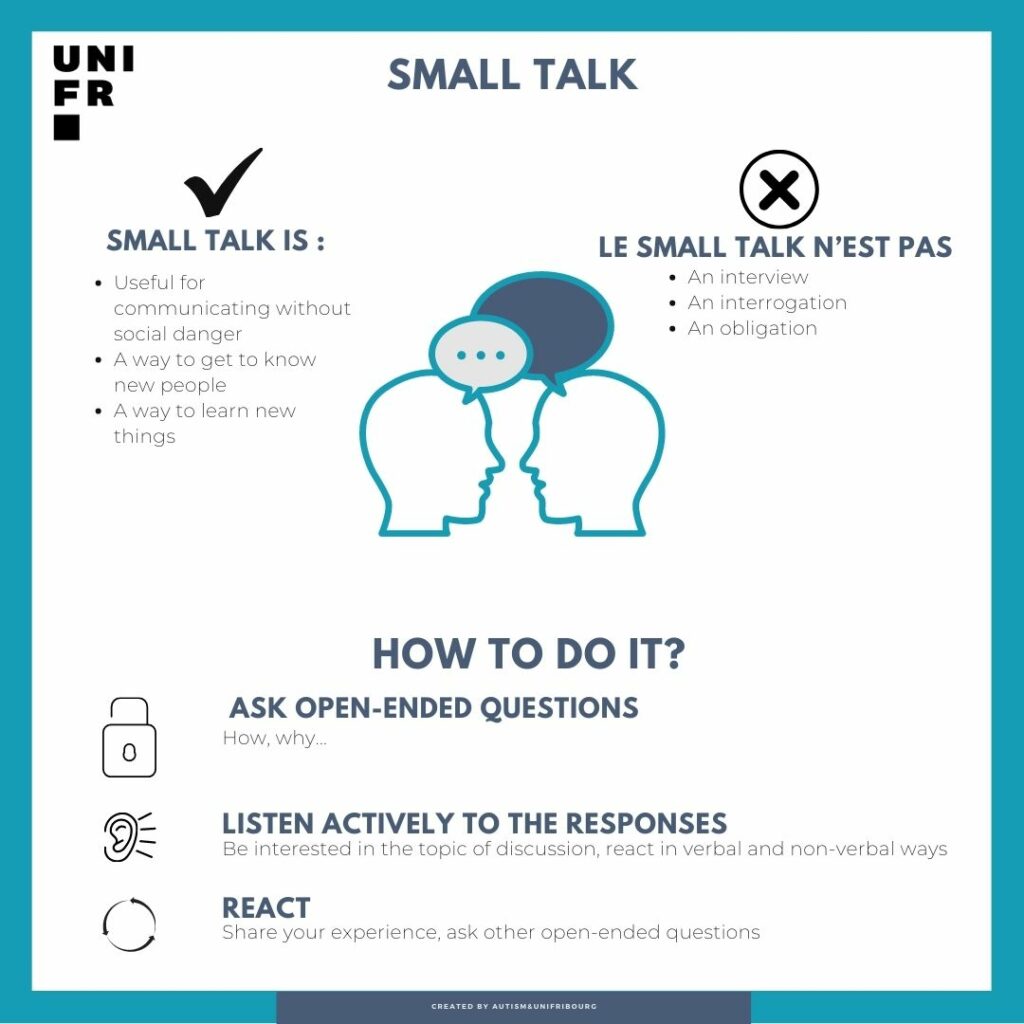This article will help you understand what small talk is for and how to use it on a daily basis.
Context
“Small talk” refers to a light, informal conversation that is used to communicate with someone.
Many people feel embarrassed by silence. But many people also feel awkward talking in the small talk mode because the interest of the conversation is often minimal or even absent.
Nevertheless, small talk allows the people present to feel comfortable during the few minutes when they first meet and get to know each other.
Small talk is a way of lightening the mood by exchanging a few words on subjects that are not very important.
What does that have to do with me?
Many so-called neurotypical people feel embarrassed to be in a silent presence with someone. To fill the silence and make themselves comfortable, a common habit is to talk in small talk mode.
Small talk is a complicated social exercise for most people.
For people on the autism spectrum, the meaning of small talk is often difficult to understand. Small talk often seems complicated. Indeed, small talk is a conversation with no real purpose other than to be in communication.
In principle, no important decisions are made as a result of this communication.
On the other hand, small talk should allow you to find common interest with the person you are talking to. This common ground can be a facilitator for your next conversations with this same person or for making a conversational link with another person.
It can therefore be a useful way of initiating social links.
What is the next step?
Think about whether you can identify when someone is doing small talk.
Practical advice
In order to be able to talk in small talk mode, it is useful to understand that small talk can be useful:
- Small talk helps to break the silence that makes some people uncomfortable
- It allows you to start a conversation with someone, even when you don’t know each other well, or at all. So it allows you to make new acquaintances.
- It brings a certain easiness on a meeting, as facts that are not at stake for anyone.
- Sometimes, thanks to small talk, you can learn information about subjects you don’t know much about.
- You can find common ground with people you don’t know well through small talk.
Strategies for starting a conversation :
- Having a pre-established routine can help you relax when facing an upcoming small talk conversation. For example, if the person comes to my right, I talk about the news, if the person comes to my left, I talk about the weather.
- Take some time to read the newspapers. Free newspapers like Watson or 20Minutes are particularly useful for finding funny stories to share.
- Have a couple of ready-to-use topics in case you have to do a few minutes of small talk.
Strategies for maintaining a conversation:
- Ask open-ended questions (i.e. questions that have an answer other than yes or no). Open-ended questions make for an interesting and dynamic conversation and encourage the other person to open up. For example, it is better to say “how do you prepare your lessons?” than “have you downloaded the presentation yet?” (yes/no).
- Respond to what the other person says in an interested way (“wow, I didn’t know that, how did you learn about that?”).
- Ask questions about the other person. For example, if the person you are talking to says he or she just got back from tennis training, you can ask “What made you want to play tennis in the first place?” “How often do you play matches?”.
- Make a connection with yourself, for example: “I’ve never played tennis but I’m not very good at ball sports” or “I played tennis once a long time ago, I’d like to try again”
- Practice active listening by showing the other person that you are interested in their conversation, for example by nodding occasionally, smiling, asking for details.
- Talk about the other person’s interest. For example, if the person you are talking to likes art, ask what museums they have visited and would like to visit, what their favourite exhibitions are, what artists they like, if they have any gallery recommendations, what kind of art they prefer, how their interest developed, etc.
Conversation techniques
- Back navigation technique: Small talk is not an interview or an interrogation. The discussion should navigate between your questions, the other person’s answers, their questions and your answers and reactions. This technique will help the other person to feel comfortable.
- The “compliment + assumption” technique (“you’re very funny, I bet you’ must be part of the acting society”). This technique will make the other person feel valued.
- The “guessing game” technique (“Where are you from? Let me guess, you are from the Valais”). This technique allows a boring conversation to take on a more playful tone.
- Technique of the conversation already in progress (“we were debating about which chocolate is better between Cailler with hazelnuts or Ovomaltine: which team are you on?”). This technique allows you to include an additional person in the conversation.
- Ask for advice technique (“You know South America well, don’t you? Would you have any advice on the first country I should visit with my mum next summer?”)
- Mix techniques: get the other person to talk about a topic that interests them, relate it to yourself or something you’ve heard about the topic recently, ask the other person a question again.
How to find a topic of conversation
- To facilitate small talk, you will need to find a safe topic of conversation that will interest both you and your communication partner.
- In Switzerland, the newspaper 20 minutes or the Watson newspaper, as well as any local or international news can be used to start a simple conversation (“Did you hear about the pedestrians on the motorway last night? Apparently it paralysed all traffic for more than two hours”).
Frequent topics of small talk :
- Culture (shows, films, plays, exhibitions you have seen): “Everyone is talking about the latest James Bond movie, have you seen it? What did you think of it?” “I haven’t seen the latest James Bond movie but I read a review that said that…. “
- Netflix or books: “Have you watched any cool series on Netflix lately?” “I’ve just finished my book on xxx, would you have a good book to recommend that you particularly enjoyed?”
- Food, restaurants or cooking: “I heard the new restaurant on Pérolles is great, have you tried it yet?” “Which food truck do you recommend?” “I tried the Lebanese the other day, I loved it, do you know if they are there on Wednesdays too? “I have to bring a dessert to my aunt’s house on Sunday, do you have any idea what to make for 10 people, one of whom is vegan?
- Your interviewer’s hobbies: “Do you have any plans for this weekend?
- Your conversation partner’s professional interests and responsibilities: “Have you always known that you wanted to be a computer scientist? “How did you realise that this was your career? “Do you work alongside your studies?
- Studies: “What is a typical day of exam preparation like for you? “If you had to vote for the best course on your course, which one would it be? Why?”
- Sports: “I watched the Gottéron game yesterday, it was close! “I saw that the next Olympic Games might be without spectators because of the pandemic, did you read that too?”
- The weather: “I decided to come by car because they were forecasting rain and as a result I paid for the car park for nothing because the weather was great!”
- Holidays, future trips: “Are you going on holiday this summer? “Are you planning to go back to Ticino for Christmas?”
- Where you are: “Have you ever had a class in this auditorium before? “Have you always lived in Fribourg? “What is different in Fribourg compared to where you lived before?”
- The course you are taking together: “How do you manage to attend all the readings ? “Do you think it’s possible to be ready for the exam in June?”
- Future desires: “One day, I’d like to take a year off too, to travel a bit, and you, if you didn’t have to find a job, what would you do with your time? “Which countries are on your bucket list?”
Questions to ask yourself
- Are you willing to try small talk?
- Which topic would you start with?
- Can you have interesting conversations too, and with whom?
About the author
Edited by Nathalie Quartenoud ©


 Back
Back 